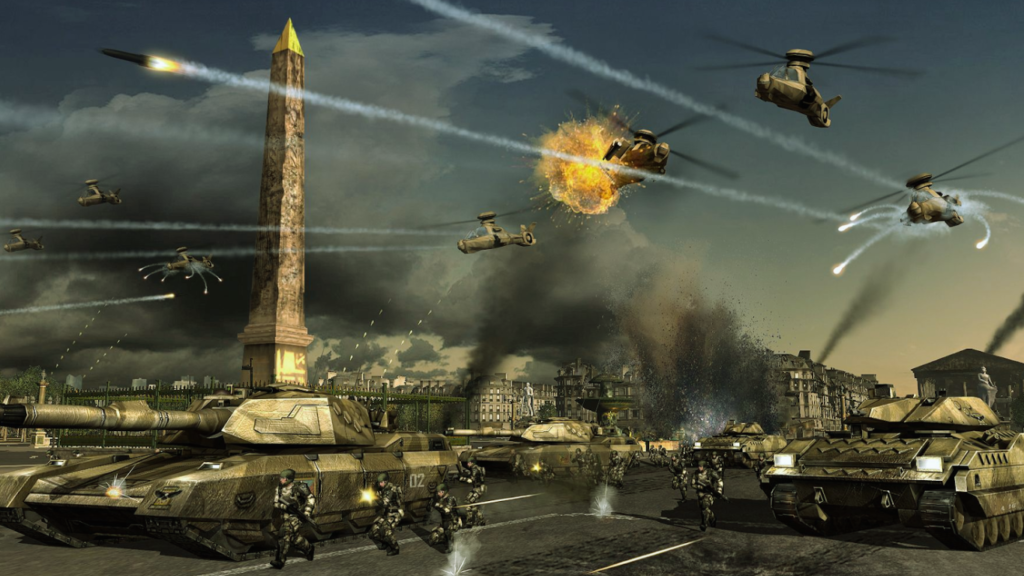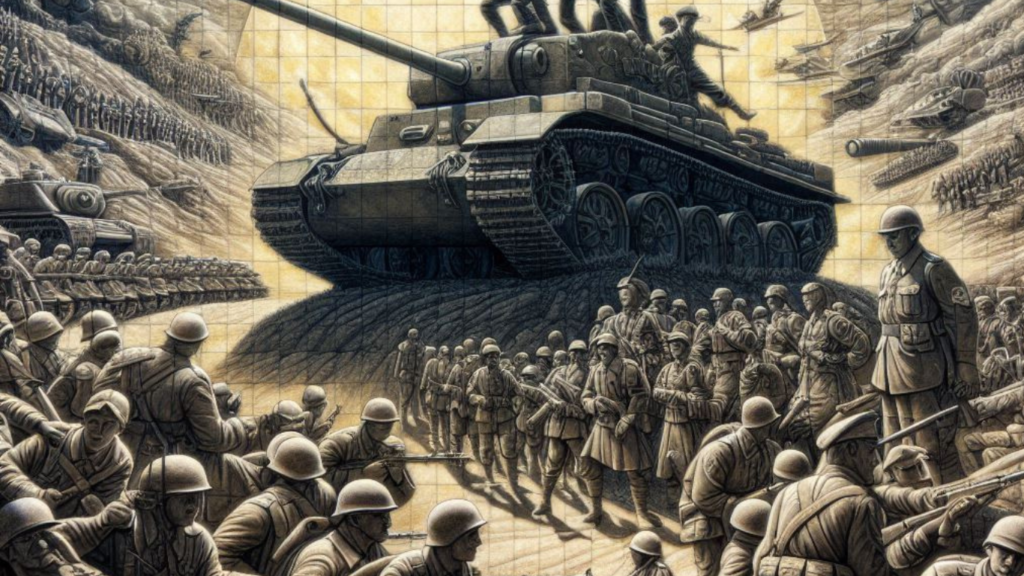Universal Conflicts
The twentieth century was set apart by two gigantic contentions: The Second Great War and The Second Great War. These conflicts were not simply fights battled on far off fields; they were great occasions that reshaped the world, impacted ages, and left an enduring effect on society.
We should plunge into the causes, significant occasions, and outcomes of these two universal conflicts to more readily grasp their importance.

Reasons for The Second Great War
Partnerships and Contentions
In the years paving the way to The Second Great War, European countries shaped mind boggling coalitions to safeguard themselves from expected dangers.
The Triple Understanding, comprising of France, Russia, and the Assembled Realm, remained against the Triple Coalition of Germany, Austria-Hungary, and Italy.
These partnerships were intended to guarantee security yet rather made a tinderbox sitting tight for a flash.
Patriotism
Patriotism was a strong power in mid twentieth century Europe. Numerous ethnic gatherings looked for autonomy and self-assurance, prompting interior and outside clashes.
The Balkans, specifically, were a hotbed of patriot intensity, with different gatherings pushing for freedom from the Austro-Hungarian Domain.
Colonialism
The race for settlements and assets energized pressures between European powers. Nations like Germany and France vied for command over domains in Africa and Asia, further stressing worldwide relations and cultivating hatred.
Death of Archduke Franz Ferdinand
The prompt trigger for The Second Great War was the death of Archduke Franz Ferdinand of Austria-Hungary in Sarajevo on June 28, 1914. This occasion set off a chain response of ultimatums, preparations, and statements of war, diving Europe into struggle.
Significant Occasions of The Second Great War
Close quarters conflict
The Western Front, extending from the North Ocean to the Swiss boundary, became inseparable from close quarters conflict. Warriors dug profound channels to shield themselves from foe fire, prompting a dangerous impasse that went on for quite a long time.
Life down and dirty was severe, with warriors confronting consistent dangers from gunnery, expert rifleman discharge, and illness.
Clashes of the Marne, Verdun, and the Somme
A few key fights characterized The Second Great War. The Primary Skirmish of the Marne in 1914 ended the German development into France. The Skirmish of Verdun in 1916 turned into an image of French assurance, with the two sides experiencing gigantic setbacks.
The Clash of the Somme, additionally in 1916, saw the absolute heaviest battling and death toll, featuring the revulsions of close quarters conflict.
Utilization of New Advances
The Second Great War saw the presentation of new military advances that changed the idea of fighting. Tanks, automatic weapons, and toxin gas were utilized broadly, prompting phenomenal degrees of annihilation and languishing.
Planes additionally made their presentation in fighting, at first for surveillance and later for battle.
Outcomes of The Second Great War
Deal of Versailles
The Deal of Versailles, endorsed in 1919, authoritatively finished The Second Great War. It forced cruel punishments on Germany, including critical regional misfortunes, military limitations, and restitutions installments.
These correctional measures added to monetary difficulty and political precariousness in Germany.
Political Changes
The conflict prompted the breakdown of realms and the making of new countries. The Austro-Hungarian, Ottoman, Russian, and German Realms generally fell, prompting the development of new states in Europe and the Center East. This redrawing of limits made new pressures and clashes.
Monetary Effect
The monetary cost of The Second Great War was monstrous. European economies were crushed, prompting a time of financial downturn and difficulty. The conflict additionally sped up friendly changes, with ladies entering the labor force in enormous numbers to supplant men who had gone to battle.
Class of Countries
With an end goal to forestall future contentions, the Class of Countries was laid out in 1920. While it expected to advance harmony and collaboration, it eventually neglected to forestall the flare-up of The Second Great War, generally because of its failure to authorize choices and the shortfall of key countries like the US.
Reasons for The Second Great War
Settlement of Versailles’ Consequence
The unforgiving terms of the Arrangement of Versailles left Germany embarrassed and monetarily disabled. This disdain gave ripe ground to the ascent of Adolf Hitler and the Nazi Party, who vowed to reestablish Germany’s previous brilliance.
Ascent of Authoritarian Systems
The interwar period saw the ascent of authoritarian systems in Germany, Italy, and Japan. Pioneers like Adolf Hitler, Benito Mussolini, and Head Hirohito sought after forceful expansionist strategies, trying to rule their districts and upset the current world request.
Expansionist Arrangements
Germany’s attack of Poland in 1939, Italy’s successes in Africa, and Japan’s hostility in Asia were totally determined by expansionist aspirations. These activities disregarded peaceful accords and incited reactions from different countries, making way for a worldwide struggle.
Disappointment of Submission
Western powers, especially England and France, at first attempted to keep away from battle through a strategy of settlement, permitting Hitler to add-on regions in the expectation of keeping up with harmony.
This technique flopped appallingly, encouraging Hitler and making war unavoidable.
Significant Occasions of The Second Great War
Attack of Poland
On September 1, 1939, Germany attacked Poland, setting off The Second Great War. England and France pronounced battle on Germany accordingly.
The quick and fierce intrusion exhibited Germany’s tactical ability and acquainted the world with the idea of Raid, or lightning war.

Clash of England
In 1940, Germany sent off a gigantic air attack on England, meaning to compel it into accommodation. The Skirmish of England saw the Regal Flying corps effectively shield against the Luftwaffe, denoting the primary significant loss for Hitler’s powers and demonstrating that air power would be a definitive figure the conflict.
Pearl Harbor Assault
On December 7, 1941, Japan went after the US maritime base at Pearl Harbor, Hawaii. This unexpected assault prompted the US entering the conflict, fundamentally reinforcing the Associated powers.
It likewise denoted the start of the Pacific Conflict, a severe and broad mission across Asia and the Pacific Islands.
D-Day
On June 6, 1944, Unified powers sent off Activity Master, the attack of Normandy, France. Known as D-Day, this activity was the biggest land and/or water capable attack in history and denoted the start of the freedom of Western Europe from Nazi control. The progress of D-Day was a defining moment in the conflict.
The gigantic annihilation and death toll prompted Japan’s unrestricted acquiescence, successfully finishing The Second Great War. These bombings additionally introduced the atomic age, bringing up moral and moral issues that continue to happen right up to the present day.
Outcomes of The Second Great War
Foundation of the Assembled Countries
In 1945, the Assembled Countries was laid out to supplant the Class of Countries and advance harmony and participation universally. The UN plays had a huge impact in worldwide relations from that point forward, however it has confronted difficulties and reactions throughout the long term.
Development of the Virus War
The Second Great War finished with the rise of two superpowers: the US and the Soviet Association. Their philosophical contrasts prompted the Virus War, a time of extraordinary political and military competition that went on for quite a long time without direct clash between the two superpowers, yet with various intermediary wars and a steady danger of atomic fighting.
Decolonization Development
The result of The Second Great War saw the quick decay of pilgrim realms. Numerous nations in Asia and Africa acquired freedom as European powers, debilitated by the conflict, could never again keep up with their settlements.
This time of decolonization reshaped the worldwide political scene and brought about new countries and provincial struggles.
Financial Recuperation and the Marshall Plan
Europe’s recuperation from the obliteration of The Second Great War was essentially supported by the Marshall Plan, an American drive that gave more than $12 billion (identical to around $130 billion today) in financial help. This help rebuilded European economies, prompting a time of phenomenal development and thriving known as the “European Monetary Marvel.”
Influence on Society and Culture

Mechanical Headways
The Universal Conflicts prodded various mechanical headways. The Second Great War saw the advancement of tanks, planes, and synthetic weapons. The Second Great War promoted advancements like radar, fly motors, and, most remarkably, the nuclear bomb. These innovative jumps had significant ramifications for both military and regular citizen life, prompting new enterprises and changing the direction of mechanical advancement.
Social Movements
The conflicts achieved huge social changes. The job of ladies in the public eye extended as they took on positions customarily held by men, a shift that proceeded with post-war. The abhorrences of the Holocaust and the nuclear bombings additionally affected craftsmanship, writing, and reasoning, inciting profound reflections on human instinct and morals.
Changes in Fighting
The techniques and advances created during the Universal Conflicts changed fighting. The utilization of motorized infantry, air power, and joined arms tasks became standard. The advancement of atomic weapons presented the idea of commonly guaranteed obliteration, generally changing military procedure and global relations.
Examples Learned
Significance of Tact
One of the vital illustrations from the Universal Conflicts is the significance of tact and global collaboration. The foundation of the Assembled Countries and different worldwide arrangements expected to keep such contentions from happening once more. Strategy and discourse have demonstrated critical in settling questions and keeping up with worldwide harmony.
Risks of Patriotism and Tyranny
The ascent of forceful patriotism and extremist systems was a significant reason for both Universal Conflicts. These philosophies advanced the possibility of prevalence and legitimized expansionism and abuse. The worldwide local area took in the significance of advancing majority rule government, common liberties, and resistance to forestall the resurgence of such damaging belief systems.
Human Expense of War
The stunning death toll and the huge experiencing brought about by the Universal Conflicts act as a getting wake back on track call of the human expense of contention. The aggregate injury and the memory of the individuals who died underline the need of taking a stab settled and staying away from war whenever the situation allows.

End
The Universal Conflicts were extraordinary occasions that reshaped the world in significant ways. They showed us significant illustrations the significance of discretion, the risks of uncontrolled patriotism, and the terrible human expense of war.
As we recall these struggles, it is significant to respect the penances made and to keep pursuing an additional tranquil and simply world.
FAQs(Frequently Asked Questions)
What were the primary drivers of The Second Great War?
The primary drivers of The Second Great War were perplexing collusions and contentions between European countries, patriotism, government, and the death of Archduke Franz Ferdinand of Austria-Hungary.
How did The Second Great War change the worldwide political scene?
The Second Great War prompted the rise of the US and the Soviet Association as superpowers, the foundation of the Unified Countries, and the decolonization of Asia and Africa, definitely reshaping worldwide legislative issues.
What were the monetary effects of the Universal Conflicts?
Both Universal Conflicts had extreme monetary effects, prompting far and wide annihilation and monetary strain. Post-The Second Great War recuperation was fundamentally supported by the Marshall Plan, which rebuilded European economies.
How did innovative progressions during the Universal Conflicts impact current culture?
Innovative headways during the Universal Conflicts, like radar, fly motors, and atomic innovation, significantly affected both military and regular citizen life, prompting new businesses and changing mechanical advancement.
For what reason is it critical to concentrate on the Universal Conflicts today?
Concentrating on the Universal Conflicts is critical to grasp the causes and results of enormous scope clashes, gain from previous mishaps, honor the penances made, and pursue forestalling future conflicts by advancing harmony and discretion.

